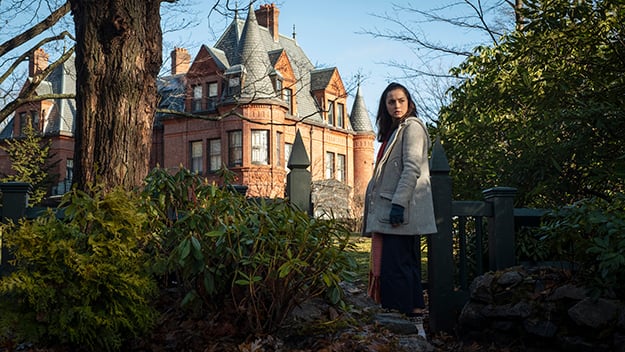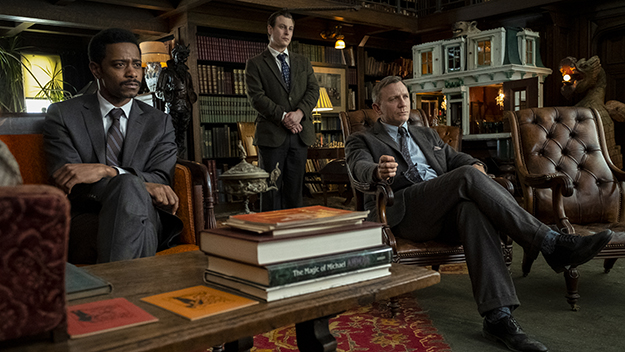Film of the Week: Knives Out

Images from Knives Out (Rian Johnson, 2019)
There are some film reviews for a which a neon-lit “SPOILER ALERT” simply isn’t sufficient. Sometimes revealing anything at all about the plot, beyond an initial setup, risks compromising the viewer’s enjoyment. These days, mind you, some voices on social media are complaining that to reveal anything at all about a film, even your opinion of its worth, constitutes a spoiler. So you’re inclined to say to hell with it, who cares about story and revelations, let’s just expose everything to the cold light of day. Bruce Willis is a sleigh, Rosebud was dead all along—get over it.
In reality, until now I can only remember one film so twisty that it was practically impossible to review, about which you couldn’t in all conscience give away anything about the plot, past the 15-minute mark. That film was Harold Becker’s 1993 thriller Malice, written by Aaron Sorkin and Scott Frank—and who knows, perhaps it’s entirely because the plot was so intricate and devious that I can barely remember anything about the film. Perhaps this suggests that, despite the industry’s obsessive emphasis on the mechanics of plot construction, we don’t really watch movies for story at all, but for all kinds of other, supposedly subsidiary pleasures.
Take for example another famously fiendish thriller (or rather, meta-thriller), Joseph L. Mankiewicz’s 1972 confection Sleuth, based on the play by Anthony Shaffer. Apart from that film’s novelty twist—actually an egregious piece of cheating that is all to do with its stage origins—who remembers anything about what actually happens in Sleuth, other than that Laurence Olivier and Michael Caine give outrageously ripe and gamey performances on a set that pushes to baroque extremes the clutter of the traditional country house murder mystery?
One person who clearly remembers Sleuth, at least the décor, is Rian Johnson, who follows the rigors of his Star Wars episode The Last Jedi by letting his hair down with a bit of gentle retro whodunit fun. Or rather, as writer and director, Johnson has invited a starry cast to let their hair down, while he beavers away with perfectionist rigor to produce a bracingly retro entertainment that knowingly processes Shaffer’s own models, among them Agatha Christie, Arthur Conan Doyle, and the master of the impossible “locked room” murder mystery John Dickson Carr—along with assorted TV derivatives, notably Columbo and Murder, She Wrote (briefly glimpsed here in a Spanish dubbed TV version).
The country house here—all paneled walls, wind-up automata, and posters for crime thrillers—belongs to elderly and extremely wealthy Harlan Thrombey (Christopher Plummer). He happens to be in the same business as the character played by Olivier in Sleuth, a successful crime novelist. Unlike Olivier’s vengeful manipulator, however, Harlan appears to be a benign and affable man—although to begin with, we can’t know for sure, since he’s seen early on with his throat cut.

How did he die? You can bet it was in a far more complicated way than meets the eye. One of the many clever things about Knives Out is that the answer is given relatively early—although the full solution to the mystery, together with the further ramifications of Harlan’s death, are gradually fleshed out in unexpected ways, while the various suspects in the case are given plenty of rope to hang themselves, or at least compromise themselves very entertainingly.
It’s not giving away too much to reveal that, being a thriller maestro, Harlan has done a certain amount of clever plotting himself. The movie is even structured in such a way that you might say that Harlan is writing or directing the story as much as Johnson is—while other characters also narrate it to us, or parts of it, in their own different styles and from different perspectives. Whether they are characters in the proper sense or Clue playing pieces brought to life by a brilliant cast is another question: there’s a certain amount of stereotype at work, as befits Johnson’s play with convention, although some of our expectations get nicely tweaked.
Among those playing pieces are Jamie Lee Curtis as Harlan’s haughty daughter Linda, who runs a real estate company with her decidedly creepy husband Richard (Don Johnson, doing a juicy turn as a boorish American version of the standard Christie cad); Toni Collette, nervy and lost in a forest of frills as Joni, the lifestyle-hawking wife of Harlan’s son Walt, who’s in charge of his dad’s publishing (he’s played by Michael Shannon as an abject mess of bulky knitwear). There’s also Chris Evans, who stalks in and out of the action with contemptuous high style as Ransom, the black sheep playboy of the family. There are members of the next generation too: notably Jaeden Martell (formerly Jaeden Lieberher, of Midnight Special and It) as Harlan’s grandson, a snooty teenager whose frequent disappearances to the bathroom aren’t for the usual reasons but because he’s busy as an alt-right internet troll. The ghastly menagerie-like nature of the clan is pointed up by Spirit’s “Animal Zoo” on the soundtrack.

And then there’s the odd character out—Marta (Ana de Armas), Walt’s carer and an Uruguayan immigrant. She’s the odd one out for several reasons: because she’s a cultural and economic outsider, virtually alone among these difficult rich folks; because she’s given particular weight as the witness of one key version of Walt’s demise; and because she has a special “tell.” This is perhaps the most audacious aspect of Johnson’s storytelling. He assures us that Marta is reliable by giving her a built-in truth factor—that is, she spontaneously throws up if she tells a lie. The film invites us to take this on trust, and its effect is to guide us through a series of logical moves: if Marta doesn’t puke, then she must be telling the truth, in which case X must be lying… or possibly not. Anyway, we’re inclined to go with Marta for various reasons: because she fulfills the traditional role of the country-house ingénue, and because de Armas, who has much more to do here than in Blade Runner 2049, gives such a brisk, alert, and altogether likeable performance, more than holding her own against her imposing co-stars. In particular, she has a mischievously complicitous rapport with Plummer, who seems to be enjoying himself enormously.
Someone you don’t usually associate with enjoying himself much is Daniel Craig, but even he seems to be having a good time, in a languid way, as the detective in this story. He plays Louisiana dandy Benoît Blanc, a figure written up in The New Yorker as “the last of the gentleman sleuths.” Blanc is first seen hovering in the background as police detective Elliot (Lakeith Stanfield, somewhat sidelined in your basic Watson role) and announces, “Mah presence will be ornamental. A respectful, quiet observer of the truth.”
Craig’s debonair presence adds to the fun, although his Blanc is pitched a bit oddly in the writing, which suggests something like a Columbo factor in reverse here: that is, rather than a shambling clown who’s really a Holmesian genius beneath the crumpled mac, we’re invited to speculate that Blanc, for all his Poirot-esque punctiliousness, may really be a clueless oaf. Or perhaps this is a red herring that I allowed to distract me: Blanc and his methods simply aren’t as interesting as some of the other characters, or other aspects of Johnson’s method. You may suspect that you’re in for something tricksy given that Johnson made his debut with a canny bit of meta-noir, 2005’s Brick, and went on to make the science fiction thriller Looper, built on those eternally recurring time-travel paradoxes.
Like a clever piece of stage conjuring, Knives Out is slight but hugely enjoyable. It’s also, for all its willfully creaky archaism, very much a Christie mystery for the Trump era, with its pleas for compassion and tart jibes at dynastic entitlement and callous xenophobia. It also, as befits the theme, has a dazzling star turn in production designer David Crank, who previously worked on The Master and Inherent Vice. He perfectly catches the ominous yet mischievous register of this house’s museum-like crammedness, but this is also one of those films, like Bong Joon-ho’s Parasite, in which a house is itself part of the plot, every corner of its architecture and furnishings integral to the story. I’ve given away too much already, so let’s stop there, except to note one of Chekhov’s rules of stagecraft: if there is a gun hanging on the wall, it absolutely must be used sooner or later. Except that here, obviously, it’s a knife, or knives.
Jonathan Romney is a contributing editor to Film Comment and writes the Film of the Week column. He is a member of the London Film Critics Circle.







